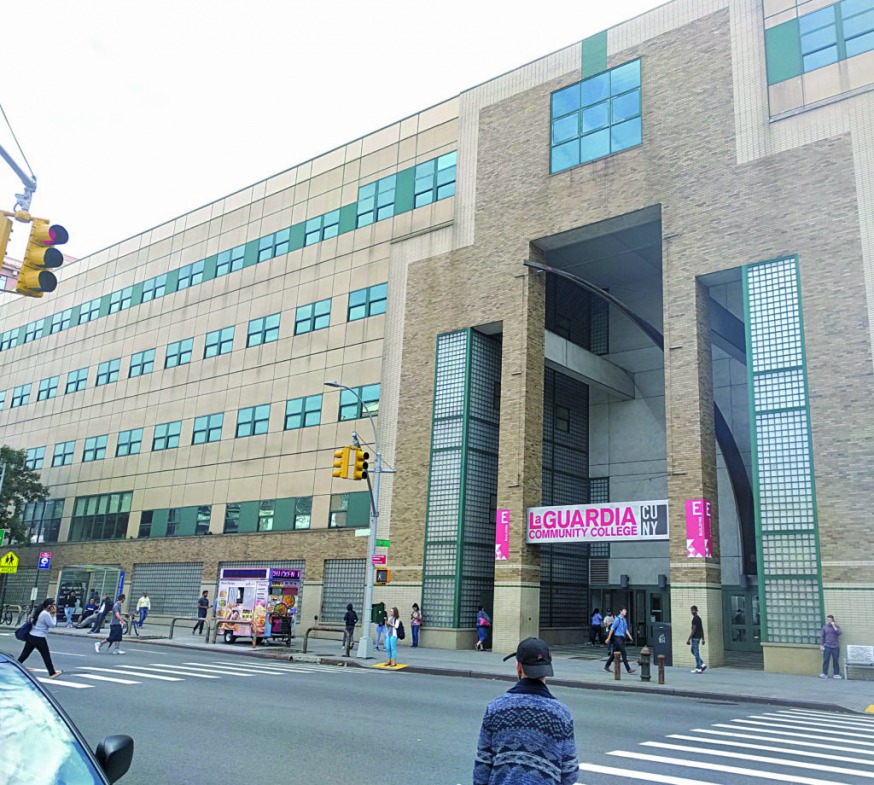
LaGuardia Community College in Long Island City is part of the CUNY system (Photo via Wikimedia Commons/Jim Henderson)
July 30, 2021 By Allie Griffin
The City University of New York (CUNY) will wipe out the debt of 50,000 current students and recent grads who experienced hardships during the pandemic.
CUNY will erase as much as $125 million outstanding tuition and fee balances through the “CUNY Comeback Program,” CUNY Chancellor Félix Matos Rodríguez and Governor Andrew Cuomo announced Wednesday.
The program aims to remove financial barriers to education and economic mobility. Many CUNY students come from communities that were the hardest hit by the coronavirus. Students’ debt to CUNY nearly doubled during the pandemic.
Eligible students and recent graduates who have unpaid tuition and fee balances will have their remaining balances cleared automatically by early August in most cases.
CUNY is automatically forgiving outstanding tuition and fee balances for students in any of three categories: students determined to have a hardship, such as those eligible for Pell Grants and the New York State Tuition Assistance Program; students who graduated from CUNY after the national emergency was declared on March 13 and who owe any outstanding balance from the Spring 2020 semester through the Spring 2021 semester; and students who have an outstanding balance of $100 or less per semester for the Spring 2020 through Spring 2021 semesters.
Recent grads and students who dropped out after taking classes between March 13 and the end of Spring 2021 semester are also eligible. The debt forgiveness will wipe clean balances from the Spring, Summer and Fall 2020 semesters and the Spring 2021 semester.
At least 50,000 students are expected to have their debt erased. The average amount students owe is about $2,000, according to Cuomo’s office.
The balances are expected to be erased automatically by early August to allow students to register for Fall 2021 classes and obtain their official transcripts. Students will be notified via email when balances are cleared.
Thousands of other students who accrued debt during the same period, but were not eligible for financial aid—and therefore will not automatically have their debts erased—can apply to the CUNY Comeback forgiveness program as well. They will need to prove they experienced financial hardship.
The application will be available in early August. Campus financial aid offices will review the completed applications to determine eligibility.
The initiative is funded by federal Higher Education Emergency Relief Funds, part of the pandemic CARES Act passed by Congress. The program is believed to be the largest student institutional debt-forgiveness measure of its kind in the country, according to CUNY.
“I view this initiative as more than just good policy; it also affirms the recognition that challenges still exist for many New Yorkers, and it helps to fulfill the moral imperative that is implicit in CUNY’s historic mandate to provide access to a quality education for all New Yorkers, regardless of background or means,” Matos Rodríguez said in a letter to the CUNY community.
CUNY has seven community colleges, 11 senior colleges and seven graduate or professional institutions spread across New York City’s five boroughs, serving approximately 500,000 students.
11 Comments

Same place as billionaire tax cuts and corporate handouts.
Great news. More money to be spent on local businesses and economy!
wow, thats very fair to the rest of us that paid off our student debt. were can we apply for the free money in this lawless city?
Did you go to school during a world wide pandemic?
Instead of his long phony speech why doesn’t Matos Rodríguez say we’re just giving more government handouts to these people.
What If a parent paid but hardship to parent not to cause hardship on the student
And a middle finger to all of you who worked your way through college, kept your expenses down and worked hard to pay your debts once employed.
Where is this money coming from?
The money is coming from the very same place it will be coming from when Republicans overturn abortion and birth control rights.
It’s magic!
Did you bother to read the article? “The initiative is funded by federal Higher Education Emergency Relief Funds, part of the pandemic CARES Act passed by Congress.”